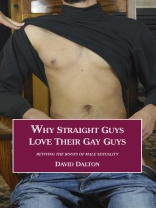After fifty years of progress and the advent of gay marriage, statistics on the well-being of gay men are as grim as ever. Rates of suicide, alcoholism, and drug abuse have not budged. Anxiety, depression, loneliness, and poor health are just as widespread. Studies have shown that gay men who live in urban gay communities actually are worse off, not better.
The utopia promised by gay marriage has not materialized. Gay men seem to have run out of ideas for future progress. There is little acknowledgment of the fact that something remains badly wrong. Nor is there a diagnosis of what is wrong.
This book proposes that the diagnosis is obvious if we look at the origins of male sexuality and how it was expressed in other cultures. The anti-sex Puritan system in which we are now immersed is relatively recent in human history. Yet in less than 2, 000 years, knowledge of how other cultures lived and loved has been systematically wiped out. The forms of male sexuality were remarkably similar from culture to culture. But starting with the early Europeans in the last years of Rome and continuing around the globe as Europeans colonized the continents, natural male sexualities have been cruelly repressed and then obliviated. We are all Puritans now.
The greatest taboo of all in male sexuality remains unchallenged and is still heavily enforced. That is the taboo of male-male sex, which until 2003 was still a crime. This book argues that the plight of gay men is only a piece of a much larger catastrophe — the Puritanical repression of the sexualities of all men, in an attempt to harness the enormous power of male sexuality for social purposes in the name of moral progress, with promises of greater glories to be found in heaven. The damage that Puritanism caused to human beings and to stable social systems was never noticed. In fact the damage and misery were regarded as good. It was seen as payback to the devil.
This book is not arguing for something new, untested, unknown, and radical. Rather, the challenge is to return to something very old — the joy of male-male sex — which took similar forms in most of the cultures that we have knowledge of. In such worlds, it was understood that some men are more masculine than others, that some men are gayer than others, and that heterosexuality and homosexuality are complementary and of equal value. And those old worlds were worlds in which every gay man was able to take for granted what to us today is the impossible dream — sex with a straight best friend.












